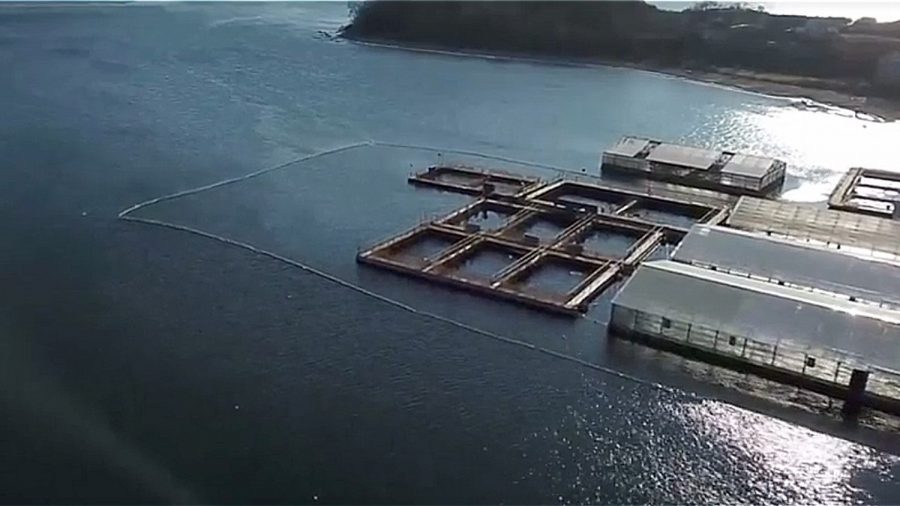The release of nearly 100 whales held captive in cages in Russia’s Far East “may take years,” French explorer Jean-Michel Cousteau told reporters in Moscow on April 4.
Cousteau, the founder of The Ocean Futures Society, is in Russia to help with the release of the captured animals, after images of the whales—kept in cramped enclosures in a bay near the Sea of Japan port town of Nakhodka—first appeared last year, triggering a wave of criticism.
Biologist and veterinarians who were allowed to see the cetaceans said many of them were sick.
Russian and international animal rights activists and Hollywood celebrities including Leonardo DiCaprio and Pamela Anderson were campaigning for their release, reported Radio Free Europe.
#WhaleNews:
‛ Russia Grapples With ‘whale Jail’ Problem As Celebrities Appeal To Putin For Help ’ | As Russian Officials Met In Moscow To Decide The Fate Of Nearly 100 Ailing Beluga Whales And Orcas Caught In The Wild And Held In A “Whale Jail” In..▼https://t.co/Xj7cB2XoGd pic.twitter.com/yxdrZeYISc— Paul Millard ???????? (@SeaShepherdPaul) March 16, 2019
“The whales are cold and because of the stress and hardship conditions [of being in the pens], their immune systems suffer and they certainly get sick,” said Tatyana Denisenko, a microbiologist who examined them after word spread of conditions at the facility. “Some killer whales had lesions on their skin, which can be associated with both hypothermia and the presence of infectious diseases and fungi.”
I’ve some exciting news – a team of experts brought 2gether by @Whale_Sanctuary & I have received an invitation from Russia’s Ministry of the Environment & Natural Resources 2 visit Srednyaya Bay to visit the notorious so-called “whale jail”. I depart for Moscow 2morrow! pic.twitter.com/cPgAT6E8CB
— Jean-Michel Cousteau (@JMCousteau) April 1, 2019
The Ocean Futures Society team was invited by Russia’s Ministry of the Environment and Natural Resources, according to a statement published by the society on its website.
“Protect the ocean and you protect yourself. We need to take care of those creatures which are on land and in the ocean,” Jean-Michel Cousteau said in a video released on the Society’s website before he left for Russia.
The Kremlin has said the 11 orcas and 87 beluga whales were held in cruel conditions and were intended for sale to aquariums and Chinese buyers.
With experts’ help, each individual whale is now known and efforts will be made to re-adapt every one “to be released naturally in the environment,” Cousteau told a news conference alongside Russia’s Minister of Natural Resources and Environment, Dmitry Kobylkin.
“The majority if not all of them, if we can release them, they will be released where they were captured. So they can be reconnected, we hope, with not only just the same species but potentially some of their family, or their group, or their friends,” he said.
“It’s not easy but it’s gonna happen, hopefully for most of them,” Cousteau added.
Can you believe there are Whale prisons in Russia… Video to come! Make sure you follow me on Facebook @PrimalWatersPodcast and my YouTube Channel Primal Waters #WhalePrisons #HelpTheWhales pic.twitter.com/UTa9zDsovb
— Primal Waters ???? (@PrimalWatersPod) February 23, 2019
It was “impossible” to release the animals during the winter without risking losing a majority of them, Kobylkin said.
“Now summer is coming when this job can be done and must be done,” he told the news conference.
According to the 1982 worldwide moratorium on commercial whale hunting, whales may be captured for scientific and educational purpose only.
In a Thursday post on Facebook, Cousteau shared that freeing orcas and other cetaceans is not new for his team, and that from 1999 to 2003, Ocean Futures Society worked with the Free Willy Keiko Foundation to rehabilitate Keiko, the star of the Hollywood movie “Free Willy.”
The fight for the freedom of Orca and other cetaceans is not a new one for Jean-Michel Cousteau and the The Whale…
Posted by Jean-Michel Cousteau's Ocean Futures Society on Thursday, April 4, 2019
With their efforts, Keiko was released into its native waters in Iceland and lived free with continuous support till it died in December 2003.
“Jean-Michel Cousteaus hope that the lessons learned through Keiko’s return to freedom will assist them in freeing the 97 cetaceans currently held in the pens off Russia’s coastline,” the post said.
Reuters contributed to this report.

